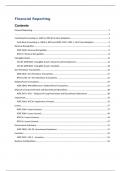Summary
Summary Financial Reporting Technical Notes for CPA Exam
- Course
- Institution
CPA Canada CFE Exam Prep Notes for Financial Reporting Topics Including: Financial Reporting Cash Based Accounting vs. ASPE or IFRS (First-time Adoption) Cash Basis Accounting vs. ASPE or IFRS and (ASPE 1500 / IFRS - First Time Adoption) Revenue Recognition ASPE 3400- Revenue Recognitio...
[Show more]



